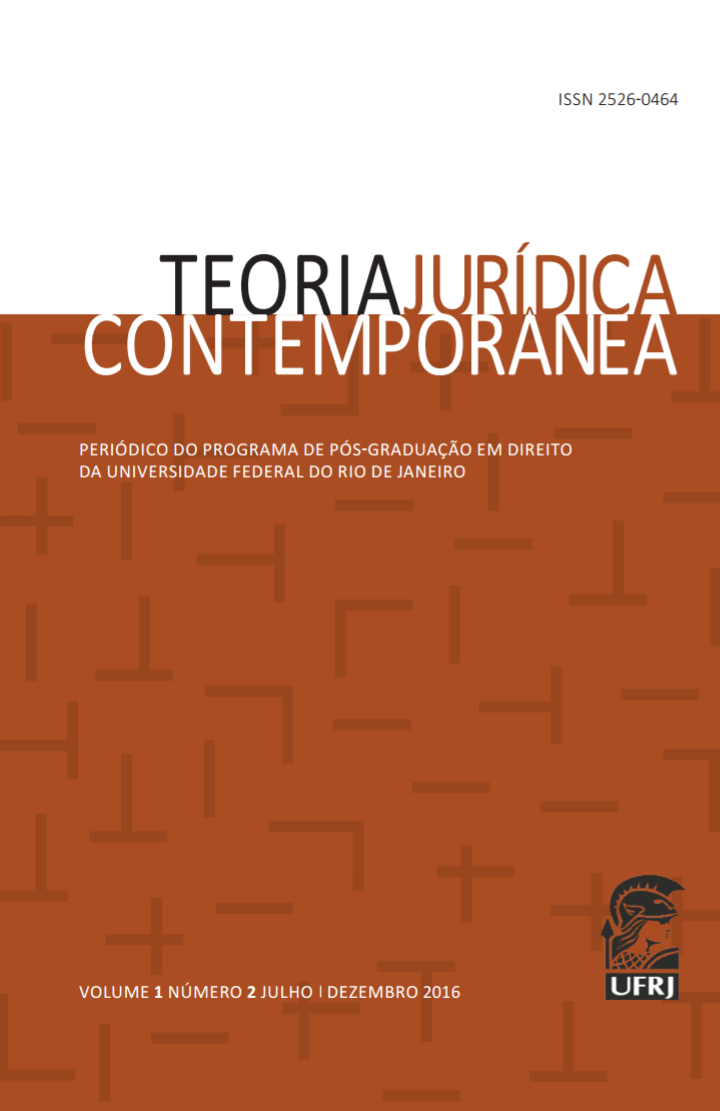Proporcionalidade -- insuficiências morais e teóricas
DOI:
https://doi.org/10.21875/tjc.v1i2.7375Keywords:
Proporcionalidade, Argumentação jurídica, Decisão judicial, Interpretação, Legal Argumentation, Judicial Decision, Legal Interpretation, Proportionality, Robert AlexyAbstract
RESUMO:
O artigo pretende engajar-se de maneira crítica com a proporcionalidade enquanto meta-regra decisória. É dividido em três seções, além da introdução. Na segunda seção apresento esquematicamente a proporcionalidade, baseando-me principalmente (mas não apenas) em Robert Alexy. Na seção seguinte analiso duas objeções contra ela. Primeiramente, averiguo o potencial da proporcionalidade em defender direitos humanos. A conclusão é que ela falha como uma defesa satisfatória desses direitos. Depois, analiso a afirmação alexyana de que a proporcionalidade consiste na única alternativa na argumentação jurídica à subsunção de um caso a uma regra. Argumentarei que essa afirmação é equivocada, porque a interpretação construtiva, nos moldes de Ronald Dworkin, não apenas surge como alternativa, mas é pressuposta pela própria proporcionalidade. Na última seção, reconstruo os argumentos desenvolvidos.
ABSTRACT:
This article intends to engage itself critically with proportionality understood as a decisional meta-rule. It is divided in three sections, besides the introduction. In the second section I present schematically the proportionality analysis, based mostly (but not only) in Robert Alexy. In the following section I analyze two objections against it. Firstly, I scrutinize its potential to protect human rights. My conclusion is that it fails as a satisfactory defense of such rights. Second, I analyze the Alexy's claim that proportionality is the only alternative in legal reasoning to subsumption of a case to a rule. I argue that such claim is wrong, because constructive interpretation, as presented by Ronald Dworkin, is not only an alternative, but is presupposed by proportionality itself. In the last section, I summarize the arguments developed.
References
AFONSO DA SILVA, Virgílio. O Proporcional e o Razoável. Revista dos Tribunais nº 798, 2002.
AFONSO DA SILVA, Virgílio. Comparing the Incommensurable: Constitutional Principles, Balancing and Rational Decision. Oxford Journal of Legal Studies. Vol. 31, No. 2, 2011.
ALEXY, Robert. On Balancing and Subsumption. A Structural Comparison. Ratio Juris. Vol. 16 No. 4, December, 2003a.
ALEXY, Robert. Direitos Fundamentais, Balanceamento e Racionalidade. Ratio Juris. Vol 12 No. 2, Junho, 2003b.
ALEXY, Robert. Teoria dos Direitos Fundamentais. São Paulo: Malheiros Editores, 2008a.
ALEXY, Robert. On the Concept of Nature of Law. Ratio Iuris. Vol. 21, nº3, setembro, 2008b.
ALEXY, Robert. Principais elementos de uma teoria da dupla natureza do direito. Revista de Direito Administrativo. Vol. 253, jan-abril, 2010.
ALEXY, Robert. Constitutional Rights and Proportionality. Revus. Vol. 22, 2014a.
ALEXY, Robert. Teoria Discursiva do Direito. Rio de Janeiro: Editora Forense, 2014b.
AUGSBERG, Ino. A desunidade da razão na multiplicidade de suas vozes -- A teoria da ponderação e a sua crítica como um programa jurídico-teórico. In CAMPOS, Ricardo (org.). Crítica da Ponderação -- Método Constitucional entre a dogmática jurídica e a teoria social. São Paulo: Saraiva, 2016.
BARAK, Aharon. Proportionality (2). In ROSENFELD, M. e SAJÓ A. (orgs.). The Oxford Handbook of Comparative Constitutional Law. Oxford: Oxford University Press, 2012.
BOROWSKI, Martin. A estrutura dos direitos fundamentais sociais na Lei Fundamental da Alemanha. In TOLEDO, Claudia (Org). Direitos Sociais em Debate. Rio de Janeiro: Elsevier, 2013.
DWORKIN, Ronald. Law's Empire. Cambridge: Harvard University Press, 1986.
DWORKIN, Ronald. Law, Philosophy and Interpretation. ARSP: Archiv für Rechts- und Sozialphilosophie / Archives for Philosophy of Law and Social Philosophy. Vol. 80, H. 4, 1994.
DWORKIN, Ronald. Isaac Marks Memorial Lecture: Do Values Conflict? A hedgehog's approach. Arizona Law Review. Nº 43, 2001.
DWORKIN, Ronald. Justice in robes. Cambridge, MA: Harvard University Press, 2006.
DWORKIN, Ronald. Casos Difíceis. In DWORKIN, Ronald. Levando os Direitos à Sério. 3ª Edição, São Paulo: Ed. WMF Martins Fontes, 2011.
JACKSON, Vicki. Constitutional Law in the Age of Proportionality. The Yale Law Journal, 124: 3904, 2015.
KLATT, M. e MEISTER M. The Constitutional Structure of Proportionality. Oxford: Oxford University Press, 2012.
KLATT, M. e MEISTER M. A proporcionalidade como princípio constitucional universal. (Tradução de Philippe Seyfarth de Souza Porto). Revista Publicum. Vol. 1, 2015.
LEAL, Fernando. Irracional ou hiper-racional? A ponderação de princípios entre o ceticismo e o otimismo ingênuo. Revista de Dir. Administrativo & Constitucional. Belo Horizonte, ano 14, n. 58, p. 177-209, out./dez, 2014.
MÖLLER, Kai. Balancing and the structure of constitutional rights. International Journal of Constitutional Law. Vol. 5, Issue 3, 2007.
MÖLLER, Kai. Proportionality and Rights Inflation. LSE Law, Society and Economy Working Papers 17/2013.
SARTRE, Jean-Paul. O Existencialismo é um Humanismo. Petrópolis: Editora Vozes, 2010.
STONE SWEET, Alec e MATHEWS, Jud. Proportionality Balancing and Global Constitutionalism. Columbia Journal of Transnational Law. 47: 72-164, 2009.
TSAKYRAKIS, Stravos. Proportionality: an assault on human rights?. International Journal of Constitutional Law. Nº. 7, 2009.
WILLIAMS, Bernard. Ethics and the Limits of Philosophy. Abingdon: Routledge, 2006.
Downloads
Published
Issue
Section
License
The authors who publish in this journal agree with the following terms:
1. The authors maintain the copyright and grant the journal the right of first publication, with the work simultaneously licensed under the Creative Commons Attribution License that allows the sharing of the work with recognition of authorship and initial publication in this journal.
2. Authors are allowed to assume additional contracts separately, for non-exclusive distribution of the version of the work published in this journal (e.g., publishing in an institutional repository or as a book chapter), with acknowledgment of authorship and initial publication in this journal.
3. Authors are allowed and encouraged to publish and distribute their work online (e.g., in institutional repositories or as a personal page) at any point before or during the editorial process, as this may generate productive changes, as well as increase the impact and citation of the published work (See The Effect of Open Access).

This work is licensed under a Creative Commons Attribution-ShareAlike 3.0 Brazil License.

